#semiotics-studies
Text
Of fandom, age, and David Tennant being our own personal Time Lord
I read the fantastic post that @davidtennantgenderenvy wrote about David Tennant and aging (if you haven’t yet read it, go for it!) and, as a fan who is closer to DT's age range than to what seems to be the rest of the fan base's age (yeah, being well over 40 is A THING), I had an interesting mix of ideas and emotions. I was going to just reblog her post with some of these musings, but when this started getting longer (and I started searching for bibliography, ha), I decided that I was not going to hijack her post, but rather cite it (and reblog it on its own right, really, read it). I should say that this is a long essay, and it comes peppered with references to one of my preferred fields of study (but I make it light and fun, promise).
Becoming an “old geek”
The first time I came into the idea was when I found a thirst TikTok with that very nice audio that goes “I think I need someone older…” and clearly, the thirst was there, but also… David is 8 years older than me, and when you are 45, thirsting over someone who is 53 doesn’t feel as “edgy” (and thinking about “needing someone older” starts verging on thirsting over people well over 65, which is absolutely fine, but a very different category over all for the rest of TikTok). So yeah, it was weird. You see someone who you feel is "in your range" and everyone is calling them "old"… And you start thinking about aging, inevitably.
Of course, I "don't feel old", but most of my friends are younger than me, and I'm the oldest person in many of my "fun activities". Take, for example, my lightsaber combat team, where every sponsorship is pitched to people under 30, and you should be training at least twice a week and following a strict diet to reach the expected “competitive or exhibition” level (enter the “old lady” who is taking this training just for fun, who needs to take care of her joints and who is not going to be invested in becoming Jedi Master General or anything of the sorts in the near future). Or we can talk about the expectation about fandom in general being a “teenage phase”, and thinking about everyone who still is into it actively after certain age as “immature” or “quirky” at best (hi, mom! Hi, work colleagues! Hi, students!).
Society, aging and social constructs
Of course, this has a lot to do with societal expectations. For almost 80 years, popular culture has been built around "youth" and "young people": before rock & roll, most things (music, clothes, movies, art in general) were targeted to “adults”, and you were expected to be “a functional adult” since a younger age. There was a seismic shift in the way popular culture was built when consumer culture decided to see and cater young people: trends became shorter, being “hip” was desirable, staying younger for a longer period was a nice aspiration (a good, light reading to get a deeper view around this is “Hit Makers” by Derek Thompson. It is written for marketers, but that makes it an easy historic overview and I like that). This has a lot to do with the change of our view about old people, too: while being old 100 years ago (yup, 1924 still fits the bill) made you “a respected elder” and you were expected to be wise, to know best, to be the voice of reason and an expert, nowadays not even us older people like being seen as “old” or “older”.
Frequently, culture becomes entrenched in binary oppositions. The binary opposition between “young” and “old” is… well, old! And while the opposition is sustained, the meanings around it change over time (that’s what the past paragraph was about, really). If in the 1940’s being old meant “mature, respectable, wise, responsible” and being young meant “inexperienced, immature, foolish”, after the 1950’s those meanings shifted a lot: being young became “fun, interesting, in the now and in the know, attractive”, while being old was about being “boring, dusty, passé, uninteresting, dull”.
In reality, being young can be a mix of all of these things (inexperienced and fun and foolish and attractive), and being old can be, at the same time, being responsible and wise and a little dusty and dull, because that’s life *shrugs*, and the wonder of lived experience is that, even if we simplify it, it is complex and rich and sometimes contradictory in itself: we can be old and foolish and interesting and boring, or young and dull and inexperienced and attractive. But, as we need to make “social sense” of things, simplifying them is… easier. That’s why we build stereotypes, and why we use them! We need to have a “base” of signifiers to build upon, so we usually take what we have on our environment and run with it. If you find this idea interesting, welcome to the world of cultural semiotics! *takes her Iuri Lotman picture out of her pocket and puts it on the desk*
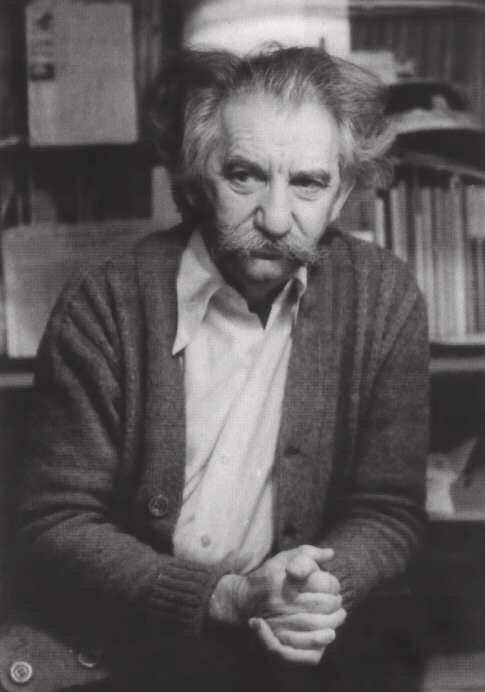
(Iuri Lotman, people. He is my "patron saint").
Pop culture versus “real culture”
Another cultural opposition that piques my interest in this area is the notion of “pop culture”, of course. It is opposed to “real, serious culture”, the sort of thing that everyone expects "older, mature people" to enjoy. In the sixties and seventies, there were a lot of studies and writing about "high brow" and "low brow" culture, trying to keep this distinction between "things that make you familiar with the now, but have no intrinsic value" and "eternal things that cultivate your mind, soul and spirit".
Evidently, if you ask me, this is a whole load of horse manure: probably useful to fertilize other things, but with little intrinsic value on its own. My main point is not dolphins, but the idea of culture: historically, it has used to mean a lot of things; from the notion of (exactly) fertilizing something and making it grow to make it come to fruition, to the hodgepodge of practices that a social group creates when they are together and are trying to make common sense of things.
I like the latter better (that is the one I’d ascribe to if this was The Academia TM, but this is tumblr!), but another popular definition, which comes from the Illustration and has been quite prevalent, is the notion of culture as the set of cultural practices that make you a better, more intelligent, far more educated person. For example: if you want to have real culture, you have to read Shakespeare and know what a iambic pentameter is, rather than watching “10 Things I Hate About You”. You must read real books, not listen to audiobooks, and “real books” should be written by “serious authors” like (insert old white Western European or American cis men, preferably born before 1960).
Here comes the notion of “cultural canon”, grinning widely. Yup, that set of practices becomes an expectation of what and how you should experience any area of the human experience, and they become a sort of “nucleus” of the whole experience, with people playing “defense” around them and culture shifting all around and sometimes across them. This is not exclusive to “high culture”: Have you ever heard about “gatekeeping”? Yeah, same fenomenomenon (Shadwell, of course). Whenever something gets this “shape”, it becomes a “norm”, the “common” thing, the “rule” if you participate in that set of cultural practices.
As every cultural set of practices tends to generate its own “canon”, they also have a lot of practices surrounding it, which are ever changing, shifting, learning from new and old practices, and redefining what everything means in their common/shared space. For example: Neil Gaiman, my beloved, was part of the “comics” frontier when Sandman first appeared, but as he and Alan Moore (yeah, I know he did it first, but Gaiman is my study focus right now, so let me be) and other very talented and interesting people started creating fascinating stuff that hadn’t been done, and they found people who loved it, they not only redefined the world of comics, but became part of the new canon themselves. And then, Neil’s presence in the world of literature and fantasy became widespread and recognized and then revered… And then he is doing it again by adapting his own work to a streaming platform in a serialized way… I hope this explains why I’m growing an obsession with studying Neil Gaiman as an author who crosses through different media: a transmedial auteur, an anomaly in his own right. But that is not an essay for tumblr, but a thesis, one that I don’t know if I’d ever have the time or mental resources to write (being a runaway ex academic with ADHD who works on their own is hard, people). Besides, this was about aging and David Tennant, so let’s cut this tangent short and start talking about our Time Lord and Savior: David Tennant, the king of frontiers.
David Tennant as a Frontier Lord
David Tennant is another fascinating case in this sense, mostly because he is an actor who has been able to build a whole very impressive career through crossing symbolic frontiers. Through his massive filmography (161 roles just for screens, as registered in IMDb) and his stage career (I love this gifset for this exact reason), he has acted his way through almost everything, from classical Shakespeare to improvisational comedy, from procedural police drama to wacky fantasy sci-fi. This has a lot to do with his personality (he loves acting, he decided to pursue acting as a career thanks to his love for Doctor Who, but he is also smart and inquisitive) but, as it happens with a lot of “frontier figures”, it also has a lot to do with “unpredictable” circumstances: less of a strategy, more of an instinct.
David has talked many times about how his impostor syndrome made him feel, for the longest time, that he had to keep accepting roles, because you never know if there is going to be another one after. He is talented and open and curious (this is quite a good interview about his perspective), but this… anxiety? meant that he had also lower quandaries about saying “yes” to roles and projects that were “less consistent” with a typecast (which has been, for the longest time, one of the main strategies to build an acting career). Yeah, he has some defining characteristics that make a role “tennantish” (I’m not starting that tirade here, but yeah, you know that almost fixed set of quirks and bits), but he has also worked his way through many different genres, budgets, styles and complexities. And he has usually been as committed and as professional in a big budget-high stakes-great script sort of situation, as he has been in a highly chaotic-let’s see what sticks-small scale project.
That can be correlated by the way he talks about “acting advice”. “Be on time, learn your lines, treat everyone the same, never skip the lunch queue”… Acting is a job, and he treats it as such. Yeah, he looks for interesting projects anytime he can, but the “down to earth” attitude about it is, once again, not-usual, not-common: pure frontier. Then, when David talks about his own self (specially at a young age), he is pretty clear about his “outsider” or “uncool” status (this interview is fantastic), and how strangely disruptive it was to become not only recognizable, but cool and sexy and… everything else, thanks to Doctor Who. He went from living in the frontier to being put in the canon, but he is still, at heart, a person who is more comfortable not defining himself by that “expected” set of rules.
Him being a very private person, who insists on having a family life that seems, form this distance, stable, loving and absolutely un-showbiz just makes the deal (and the parasocial love and respect) easier to sustain; as does his openness to talk about social and political issues that interest him (passionately, again; against the norm for “well liked celebrity”, again). His colleagues also talk wonders about him, mostly because he is this sort of down-to-earth but also passionate about his craft and easy to work with. Again: not the “norm”, not the “rule” of being such a celebrity.
Many of his fans (should I say that I’m one? Or is it obvious at this point?) find this not only endearing, but comforting: he is a massive star, who has acted in a lot of terrific roles in huge productions… But he feels, at heart, as “one of us”. But he is, also, a well-respected thespian, a Shakespearian powerhouse, an international talent. He lives in a very authentic, but very unstereotipical frontier. And he seems happy about that and has made a career from it. Extensive kudos and all the parasocial love and the amateur-actress mad respect for that.
I should mention, just in passing, that a “natural” archetype for this characters that traverse frontiers… are tricksters. Think again about the “tennantish” characteristics. Here goes another essay I’m not writing right now.
Aging: The Next Frontier
This takes me to the original post that inspired the essay: living in a culture where the “norm” is “being young and famous is a desirable aspiration”, we have a fantastic actor, at peak of his craft, who is in the heart of middle age (past 50, nearing 55). Not only that, but he is an actor with whom at least a couple of generations have grown older: from the ones who feel him as “our contemporary” to the ones who grew up looking at him (like Ncuti Gatwa!).
David, being the frontier person he is, has been navigating this transition in a very “unconventional” way: he came back to the role that made him iconic (The Doctor, now with more trauma!), is starring in another fantasy series about middle-aged looking ethereal beings that at times is an adventure thriller, at times is a comedy of errors and at times is a romcom (having another beautiful trickster of a man as his co-star… There goes another tangent that is an essay); he is playing one of the quintessential Shakespeare roles for middle-aged men (Macbeth), and is, seemingly, having a lot of fun doing a lot of voice acting for animation roles (if you haven’t watched Duck Tales, you’re missing a whole lot of fun, really).
Traditionally, middle aged actors navigate that period of their career trying to reinforce their “still young, thus a celebrity” status (for example, doing a lot of action-packed movies and keep doing their own stunts while seducing women 20-30 years younger than them), or strengthening their “prestige thespian, so now a real culture person” position (fighting for more serious roles, going from comedy to drama, or working their way into The Classics©). Sometimes, they face the internalized societal expectation by also becoming a shipwreck in their personal life (yeah… the stereotype of “getting divorced, having an affair with someone half their age, getting another red convertible, getting in trouble…”) because we don’t have a good “map for aging responsibly” yet as a society. We have been so focused on youth, that we have forgotten how to age.
Again, switching to the personal experience. I was raised as a female-shaped person (yeah, being queer is fun), so part of the experience of growing (and then growing old) has been closely related with that concept from the female point of view. I decided, pretty early on (but not so much, probably 25 years ago), that I wasn’t going to conform to the norm… And that included aging naturally. When I found my first white hair, it was a shock (I was 21 or 22), but I had already seen my father fighting his own hair being white since forever. I decided it was a loss of time, money and effort… And the judgement from people in my generation and in the one that preceded me (my mother, my aunts) was stern and strict: “it will age you, and it will date us. You shouldn’t do that”. Men could do it, given the right age (being over 50) but women must not. Same with wrinkles and sagging and gaining weight and getting “pudgy”. But when men grew older, they needed to make a “show off” of their ability to seduce, to “still be a man”. Aging, then, was undesirable by any standard.
As me and my peers have grown older, and my hair has gotten increasingly silver, there have been women that come to me saying that “I look great” and “they wish they were as brave as me”. I would like to state in front of this jury of my peers (hi, tumblr!) that the only bravery it took was deciding, somewhere between my twenties and my thirties, that I wanted to be as myself as I possibly could, so no bravery at all, just the same lack of understanding of social rules that took me to become interested in… you guessed it, cultural semiotics. We’ve come full circle with this. Now, let’s finish talking about what it means for an aging fan to have an aging star to look up to, shall we?
David Tennant as a cultural Time Lord
I am pretty sure that he wouldn’t have chosen this role for himself (as he wouldn’t have chosen being a massive star just by playing his favorite character and being so talented and charming), but he is, as Loki would say, burdened by glorious purpose. Being “the actor of his generation”, and him crossing so many frontiers with such ease and grace, without even thinking about it too hard, just because he is a hard worker and likes to try new things and is just so good at what he does put him in the exact cultural crossroad for it.
He is not in a sudden need to “resignify himself” as anything: he has already shown his very flexible acting muscles through his very long career. He is not bounded to “keep his public image relevant”: he likes to have his personal life clearly separated from the spotlight, and being married to the brilliant and funny Georgia, who herself grew up with a famous father, so she is no stranger to staying sane and in control in the eye of media, and who manages their social media presence with a good mix of humor and well-set boundaries.
Therefore, he is in a moment where he can (and probably will) chose to do whatever he likes. And he has the public support to do so: he is prestigious and respected, but likes to make fun of himself and is not self-important; he has a lot of awards, but he is also a very likable person with whom most people in the industry enjoy working. And he is up to do a lot of things: heroes, villains, morally grey characters; romance, drama, thriller, fantasy, sci-fi, procedurals, historical fiction, classic plays, silly parts, voice acting… We are going to see him aging on screen and stage, with no playbook: the playbooks were written for people that certainly are not him. And I have some evidence to prove it.
He is starring in a groundbreaking series (yeah, Good Omens) where the protagonists are two middle-aged looking entities, full of queer relationships, written by another trickster. This series, in an on itself, is a showcase for characters that are rule breaking in many ways: in the narrative, by being hereditary enemies who are inevitably linked to one another by a loving bond that may or may not be romantic, but that has been in the making for 6,000 years; in representation, by having the protagonists being represented by a couple of middle aged actors who are “not serious” and “not action” coded, in a role where they are delivering romance, banter, intrigue, joy and a whole other range of emotions that are “not your stereotypical” middle-aged male-lead coded.
He also delivered the baton on a relay race with Doctor Who: he came back after almost 20 years, to bring back the generation who grew up watching him in the role, and deliver us into the arms of Ncuti Gatwa’s 15th Doctor, with the promise of taking a rest and working on getting better from all the trauma The Doctor has endured in 20 years Earth-time (which, as any Doctor Who fan knows, account for centuries of trauma in Doctor’s time). Not your usual Doctor Who Anniversary cameo, but one built to deliver some zeitgeisty emotional health promises that made the specials feel… healing. At least, for some of us.
Even when it wasn’t the hit series it deserved to be, his Phileas Fogg in “Around the World in 80 Days” is also a great delivery of an unconventional middle-aged protagonist, who goes from meek and scared and too worried about societal norms, to a lovely, tender, slightly awkward and daring person, with friends half his age who look at him but are also his peers (another kind of relationship that is not very frequent in media).
And, with all fearlessness, he has played a lively old duck in Duck Tales! Scrooge McDuck has never been a middle-aged character: he is, quite openly, an old gentleman. An adventurer, quirky, with a lot of spunk… but also quite clearly an elder to Huey, Dewey and Louie, and obviously older than Donald Duck (who is also not a young adult himself!). When you watch that series, and if you have the opportunity to catch any glimpse of him behind the scenes while recording the part, you can feel the joy he got from playing the part (and he has said time and again that he IS Scrooge McDuck, so it will become his “recurring bit” for the future).
Hopefully, David (and some other actors and actresses, for sure) will dare to build that new “aging publicly without making an arse of myself” playbook, and I (and I can imagine, many other fans in our middle age, but also fans that are right now leaving behind the “young adult” stage and becoming “adults” fair and square, and others who will arrive to this place at a future time in their lives, so I hope) will be there to bear witness, support, cheer… and learn from the model. Because that’s what fandom is about, but also because that’s how culture itself gets shaped and changes, continuously. And that is exciting and a little scary, and that’s why it is better if we do this together.
And I'd love to imagine diverse (in the full sense of the word) role models for this process and this playbook, too!!!
If you read all the way through this, I'm very grateful, take a cookie, have a gold star and suggest names for our aging interestingly role models on the "non-white-male" side of things!
Class dismissed!!
#david tennant#aging#aging gracefully (or not)#long essay#long post#cultural studies#cultural semiotics#I need someone to pay me for writing this sort of stuff really#when I said I was writing again I meant it#this was 6 pages long in Word#and it includes references#look at my (written) child#the doctorate in cultural studies would never#neil gaiman
105 notes
·
View notes
Photo

Roland Barthes, Signs and Images. Writings on Art, Cinema and Photography, Essays and Interviews, Volume 4, Translated by Chris Turner, Seagull Books, London, 2016
(on the way of Barthes Studies, via Jeremy Fernando)
#graphic design#semiology#semiotics#calligraphy#visual writing#book#cover#book cover#roland barthes#chris turner#barthes studies#jeremy fernando#seagull books#2010s
124 notes
·
View notes
Text
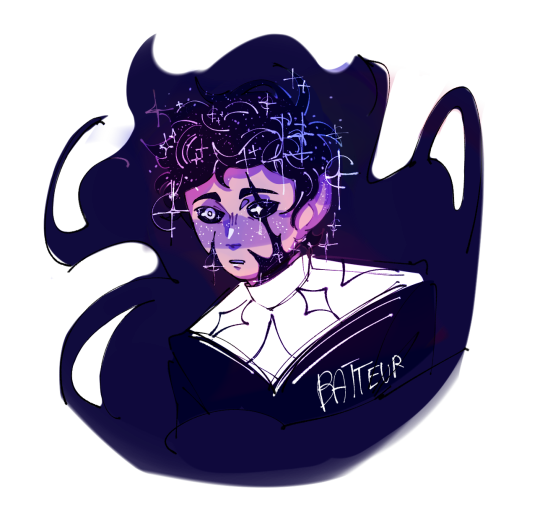
man's looking like a grape
#danny phantom#dp#danny fenton#ibispaint art#dp au#space obsession danny#space core danny#I'm supposed to be studying semiotics#but naaaah
305 notes
·
View notes
Text
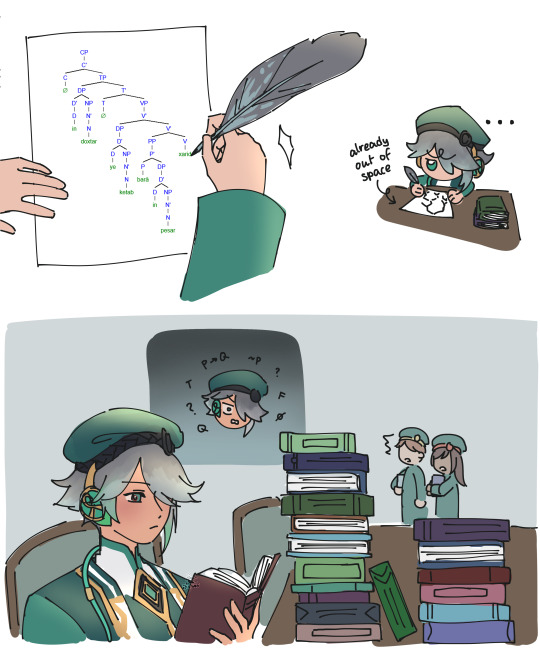
do you think they have x bar theory in teyvat
open for better quality | no reposts
#alhaitham#genshin impact#genshin#fanart#myart#doodle#all the architecture majors are projecting onto k.aveh but where is the representation for the ppl who studied linguistics!!#mhy is like 'haravatat has the lowest enrollment numbers' please we don't have to be this accurate to reality ok#the semiotics student experience: gigantic syntax trees. the godforsaken lexical entry matrices. truth tables ;;;;; etc#oh and the gloss for the syntax tree should be smth like 'the girl bought a book for the boy' and it's an ipa transcription of persian#not sure if this looks good bc i'm in a funk rn but i will go do some housecleaning and that will fix me#enjoy!!
124 notes
·
View notes
Photo
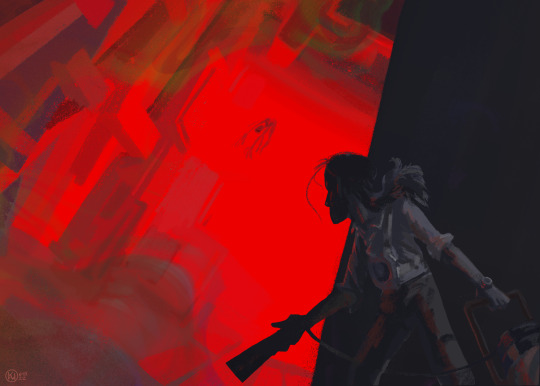
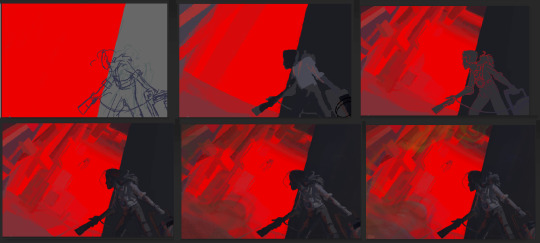
“make a control oc” they said “it’ll be fun” they said well sure it’s fun for ME but my little guy is literally having their worst day at work ever soooo
#control#control 2019#mine#oc#had a LOT of fun with this one!!! i go crazy for bright neon/digital colors although i had to take breaks at night bc the light in my room?#just made discerning those fine shades of red really difficult LOL#anyway i decided my little guy has a degree in semiotics (study of symbols) and a minor in graphic design. more to come maybe. or maybe not
150 notes
·
View notes
Note
HOW THE FUCK DID YOU PREDICT THAT
here's dialogue i accidentally cut out of translation theory pt2
/
Did it frustrate you? The order to hold position?
Why are you asking me this?
It is on my mind.
No. I understood it.
I would have wanted to fight, if it were me.
I am not you.
/
looks like i can use it in pt3 😭
5 notes
·
View notes
Text
okay. if i want to stay in ****** i can apply to history of art or english programs for a dissertation topic of performance of the self through autobiographical auteurship, which would totally fall under film/tv studies with the way my sample syllabus is shaping up right now. there are some good options for both around here! **** is the most promising, followed by **** **** i guess for nostalgia's sake. i can always stay at ****** in dance or go english/art history there too. really excited and looking forward to the upcoming application cycle
#i love you film studies i love you tv studies i love you performance studies#all falling under a rhetoric of semiotics
4 notes
·
View notes
Text
Can anyone explain paradigmatic/syntagmatic relationships in semiotics w examples bc everything my professor has put in the lecture slides about it makes no sense to me lmao
#studyblr#study blog#langblr#langblog#anthropology#anthro#language learning#languageblr#semiotics#linguistics#linguistic anthropology#symbolic#studyblr community
3 notes
·
View notes
Text
any experienced multimodal analysts have any Thoughts on ELAN? i'm on a hunt for a mac-compatible software for annotating vids that allows for a customizable coding scheme. lots of the ones i've seen are for conversation analysis -- which is awesome, but not aligned with my needs
#michelle's thesis#yes a new tag lol#gradblr#ELAN#multimodal#LOL i have no idea what to tag this so ppl can see it#conversation analysis#studyblr#research#phdblr#graduate school#grad student#grad school#grad studies#救命#for context i'm analyzing long-form video essays -- a descriptive sort of component descriptive analysis?#so the often crazy and chaotic multimodal/semiotic entanglements ... warrant a software
2 notes
·
View notes
Text
sometimes I am like 'boy I am So Normal' and other times I am like 'wow my grandmother sure did give me a lot of undergrad level art criticism to chew on when I was like 13'
#red said#both the good thing and the bad thing about my grandma was that she didn't talk down to kids#and she had taught undergrad art school#and I'm not sure i was always 100% on board on account of being A Child#but she had me reading Klee's pedagogy of drawing when i was like 8#and oh god what was it. herbert read's 1930s analysis of modern art? when i was like 14#i know this bc my year 9 portfolio is full of anime art and a big typographic quote about interpreting art from read#now when i go to art galleries with my friends i vacillate wildly between 'haha look at how weird this guy's hair is'#and 'the impasto creates a kind of paradoxical verisimilitude!'#bless them but i was walking around a gallery with my partner enthusiastically going on about trompe d'oeil and marxist analysis of realism#and i said '... does that make sense' and they said 'nothing you've said for the last 20 minutes made sense but it sounds cool'#and people think I'm like this because i went to art school#NO THE ROT SET IN WELL BEFORE THAT and also like i did a year less study than my classmates at undergrad#and i still found most of them hadn't heard of most of the terminologies i was throwing around#it wasn't until my masters i started meeting other people who were hype about critical theory#and then i felt stupid bc tbh i haven't like. STUDIED it formally. i just pick bits up.#so when i was talking to someone with a really thorough grounding in semiotics i was just Saying Words#understood what she was saying but couldn't back up my own points enough to feel like we were on an even keel
20 notes
·
View notes
Note
But that’s wrong? Someone can say “Its raining”, but that doesn’t mean the other person hears or even understands them, even if they speak the same language. It means nothing.
I mean, we can just talk about the sequence of sounds that we can write out phonetically as /ɪts ˈreɪnɪŋ/. And yes, those are inherently meaningless. It's just a bunch of noises! As I said, nothing iconic, or even remotely evocative of rain.
But meaning is formed around that sequence of sounds by those who create and hear it - speaker and listener alike. And that meaning is predicated on a wonderful mix of speaker intention, listener bias, historical context, shared cultural knowledge, and a host of unspoken conversational maxims and patterns.
I was definitely focusing on the meaning as interpreted by the listener in that last post, so I'm sorry if that confused things. And I was sort of assuming that the listener and speaker were in an ongoing conversation and understanding each other. But even if they weren't, even if the listener couldn't understand the speaker, that doesn't mean the utterance itself "means nothing". If said with the intent to communicate, then it definitely means something at the very least to the speaker! Like you said - someone can say it! And there lies a full half of the meaning.
Conversation is inherently a collaborative act, but it starts with the speaker's intent behind an utterance. They're taking a complex idea - the concrete "rain", the more abstract "-ing" and "'s", the somewhat idiomatic "it" - and turning that combination of ideas into the movement of a stream of air, following a strict set of patterns and rules that developed organically over thousands of years. That's neat!
If the listener doesn't speak the language, or mishears, then they may not pick up on that meaning. It could just be sounds, to them. Or they may even misunderstand, and pick up an unintended meaning. If they lack some of the required context (e.g. by not knowing a word), or if the speaker is flouting one of those unspoken maxims (e.g. by being sarcastic) and the listener doesn't realize it, the meaning may be warped.
The utterance of the sounds /ɪts ˈreɪnɪŋ/, the writing of the phrase "It's raining", you're right that these aren't inherently meaningful. If the sequence "itsraining" happened to appear in a randomly-generated string of letters, I wouldn't personally assume any meaning to it. And since this train of thought did start on the topic of magic, I'll say I find nothing particularly magical about a string of random sounds or letters either.
(Now, if you did see meaning in that random string, I think you'd effectively be practicing some kind of divination, by believing that there was intent behind the randomness. That the universe or whoever or whatever produced the string was actively trying to communicate with you. That's a pretty common idea when we talk about certain kinds of "magic". I think it's interesting that words, symbols, and communication from some unseen "speaker" are so integral to our understanding of it, and I think there's something to be said there for seeing language itself as an inherently "magical" thing regardless of whether your interlocutor is just your next-door neighbor or... whatever you personally believe is at the other end of an alectryomancy session. But dammit Jim I'm a phonetician, not an occultist.)
Point is, in conversation, in the context of a person speaking to another (regardless of whether it's understood), an utterance (or any sequence of symbols) is meaningful because of the intent behind it. Not the sounds themselves, but the very act of turning ideas into symbols - and back again.
...
I apologize if I'm repeating myself a bit - it's quite late and the question of "what does it mean for a utterance to have meaning" is actually a really interesting and complicated one, anon!
I'm admittedly being more flowery and less technical about it here because in the end my other main point is just "Isn't language really astoundingly neat?", but this is the stuff from which journal articles are written. (Usually involving a surprising amount of predicate logic.) It's an important line of inquiry because it can help explain a lot of where communication goes right and wrong, how misunderstandings happen, and how to effectively convey ideas to others.
That said, to be fair this isn't my specific area of expertise - I'm in the phon/phon corner where we ask people to make noises and stare at spectrograms all day, this is more the sem/prag corner where they put lambda calculus and philosophy in a blender.
@cryptotheism Ach, look what you made me do, I'm rambling about sounds.
#linguistics#semantics & pragmatics & semiotics are entire fields of study for a reason! people can and do spend years talking about this very issue.#I took a great pragmatics class once - the first week of which was titled ''what does 'mean' mean?''#for instance - if a speaker says ''it's raining'' aloud to -themself- without intent to communicate with a separate listener#is it still a meaningful utterance?#it doesn't add things to any kind of conversational common ground#but it may still serve a specific purpose to the speaker in helping them organize their thoughts#and it isn't a random string of sounds said for the sake of making sounds#so we can argue that it does indeed still have meaning#magically speaking I'd jest that the speaker is casting a one-person spell of 'remind myself why I picked up that umbrella a second ago'#now... could a random string of sounds said by a person with the sole intent of making meaningless sounds... have meaning?#it may convey information! that information being ''I am making some meaningless sounds.''#it's not really -language- but does it -mean- something?#does it -mean- something in a different way from how 'it's raining' -means- something?#and from there you get into a couple different definitions of the word 'mean'#the specifics of which I don't remember though now I sorta want to track down the paper we read that first introduced it#it was super interesting and a bit of a mind-bender#sam says stuff sometimes#sam says... a lot of stuff apparently - whoops#I'm sorry anon I didn't intend this to turn into a small essay
20 notes
·
View notes
Text
And the writing keeps flowing!
3 notes
·
View notes
Text
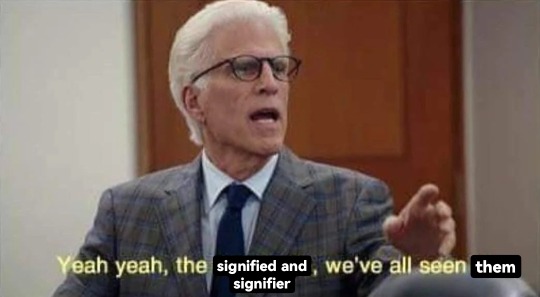
#I don't know how wide the target audience for this is#but I do find it pretty funny how semiotics is mentioned in literally every single humanitarian studies course ever#30 exams in and folks are still like 'sometimes words have meanings'#ramble tumble#languages#uni
8 notes
·
View notes
Photo
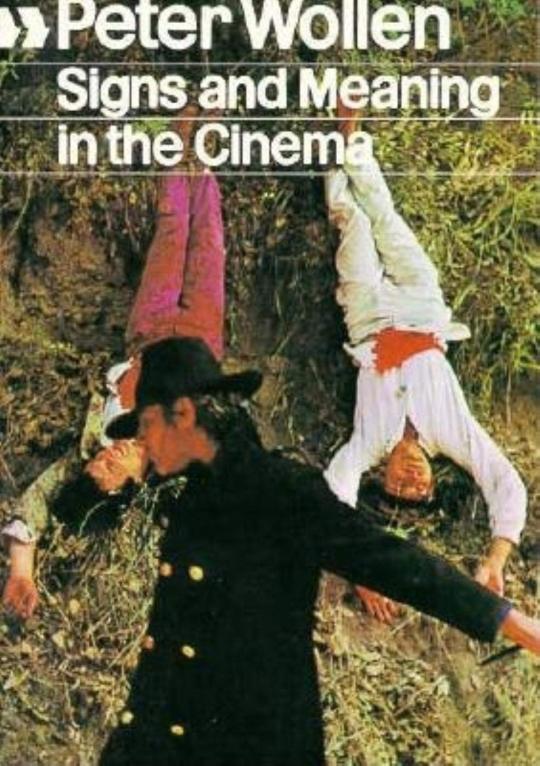
https://archive.org/details/a-companion-to-luis-bunuel-pdfdrive.com/Signs%20and%20Meaning%20in%20the%20Cinema%20%281972%29/mode/2up
17 notes
·
View notes
Photo
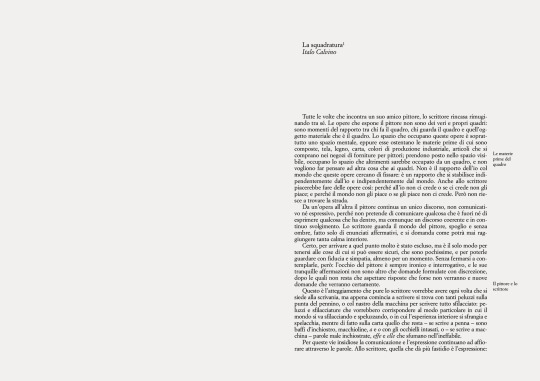
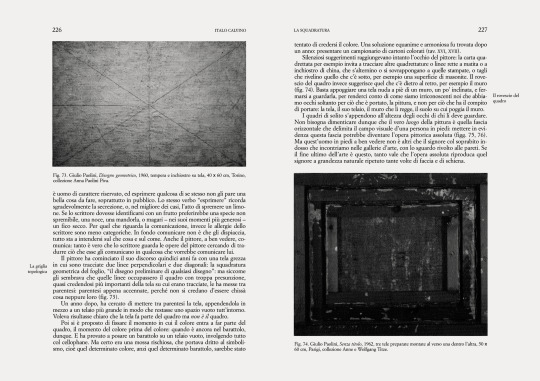

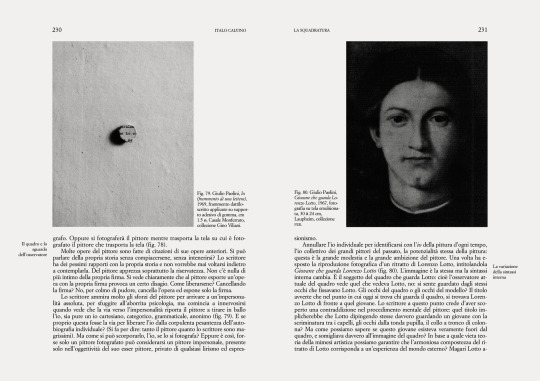
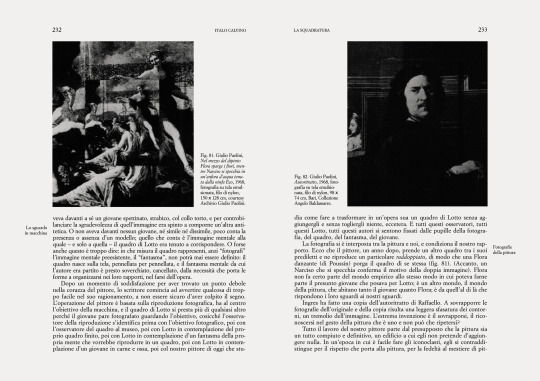

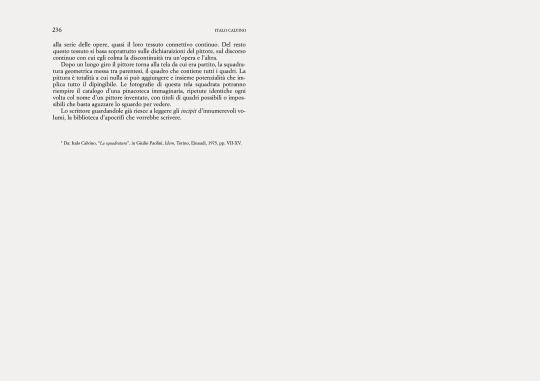
Italo Calvino, La squadratura, in Semiotiche della pittura. I classici. Le ricerche, Edited by Lucia Corrain, Meltemi, Roma, 2004, pp. 225-236 (pdf here) [from: Italo Calvino, La squadratura, in Giulio Paolini, Idem, «Einaudi Letteratura» 39, Einaudi, Torino, 1975, pp. VII-XV] [«EC» – Rivista dell'Associazione Italiana Studi Semiotici, Palermo]
#graphic design#art#semiotics#magazine#journal#book#italo calvino#giulio paolini#lucia corrain#ec#associazione italiana studi semiotici#aiss#meltemi#einaudi letteratura#einaudi#1970s#2000s
27 notes
·
View notes
Text
going to write something for alhaitham and i am finally going to use my degree to simp HAHAHA
#i havent opened my language theories textbook in forever but now i can#alhaitham is apparently versed in semiotics#my fave theory tbh jdjdjdj#tho technically its the study of signs and symbols and how we interpret them#this alhaitham brainrot is just an excuse to nerd abt linguistics lol
2 notes
·
View notes